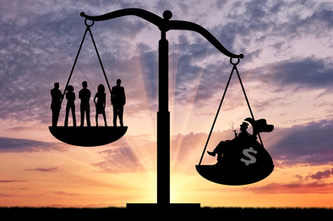There’s nothing that the national media – and social media – like better than a good “crisis.”
The word is a surefire attention getter.
If you want to attract as many clicks, likes, shares, advertisers and subscribers as possible, make sure to put the word “crisis” in your subject line or headline, as I have here.
People are exquisitely attuned to risk. So they are generally willing to give you a listen if you warn about a brewing crisis – and provide a potential solution.
Politicians love a good crisis too. Why? Because it gives them something to run on.
Leave aside for a moment the inconvenient fact that the government itself has played a major role in everything from the border crisis to the debt crisis to the crisis in higher education.
Politicians need attention, donations and votes. So they proclaim loudly what they intend to do to fix the problems that they created, ignored or made worse.
Political action groups do the same, even when they must distort the facts to make their case.
Take Oxfam, for example, and the supposed crisis of economic inequality.
Oxfam describes itself as “a global organization that fights inequality to end poverty and injustice.”
In its annual report released last month, it warned the world about “widening and extreme [economic] inequality.”
I’m tempted to insert the story of Peter and the Wolf here. But instead, I’ll just let the facts speak for themselves.
According to the recent UBS/Credit Suisse Global Wealth Report – the very one that Oxfam used to reach its conclusions – most inequality indicators are at their lowest levels in a century.
The global Gini coefficient measuring inequality has fallen from 92 to 88 since 2000.
The top 1% of income earners saw their global share drop 9.2% over this period.
Global poverty is now at its lowest level ever recorded – 8.6%, down from 29% in 2000.
Oxfam – like many people and organizations – doesn’t understand how the global economy works.
It believes that wealth and poverty is a zero-sum game.
The only way one person gets more income – or greater wealth – is by denying it to someone else.
If the world economy were a pizza, this would be true. A hungry person who took two slices would leave fewer slices for everyone else.
But that’s not how the economy works.
Economies expand over time. Incomes grow. And so does household wealth.
It’s not true that the rich are getting richer and the poor are getting poorer. Or that one person’s success is another person’s downfall.
If you got a raise last year, it didn’t make someone else poorer.
If your portfolio earned a big return, it doesn’t mean someone else’s returned less.
Anyone who is willing to work, save and invest can improve their economic security and achieve some measure of financial independence.
The real shame of Oxfam – and other organizations that exaggerate the problem of economic inequality – is that they always blame “the rich” instead of encouraging the non-rich to get educated, develop skills, and embody the personal characteristics (like reliability and persistence) that will allow them to rise economically.
Yes, some folks will lag due to no fault of their own.
Some are born with a low IQ. (A big detriment in a knowledge-based economy.) Some may have physical or emotional limitations. Others may have simply had a run of terrible luck.
But Oxfam dislikes wealth more than it hates poverty. So its proposed solutions are never about empowering the individual to create real change.
Rather its solutions are always more taxes, greater redistribution, higher minimum wages and paid-leave mandates.
Unfortunately, history shows that these policies lessen opportunities for those at the bottom of the income ladder, making it harder for them to succeed.
To fix the income inequality that matters most to you – your own – the key is not to focus on what other people have but to ask a few questions to the face in the mirror.
Have I done enough to increase my value to my current or prospective employer?
Have I managed my monthly wages and expenses well? (If your outgo exceeds your income, your upkeep becomes your downfall.)
Have I invested my savings wisely?
Have I left my investments alone to compound – Warren Buffett calls it “a snowball rolling downhill” – so that it creates substantial wealth?
These are the questions that can lead to powerful, life-changing habits – and true financial independence.
Being resentful and envious of those who have more?
That doesn’t achieve much. Unless the goal is to feel bitter and angry.
